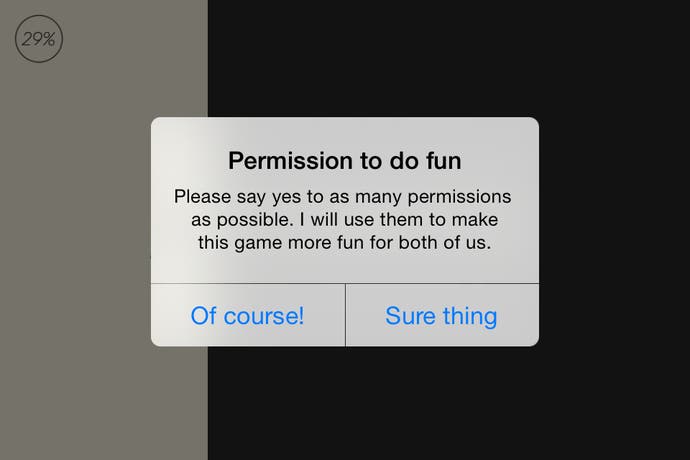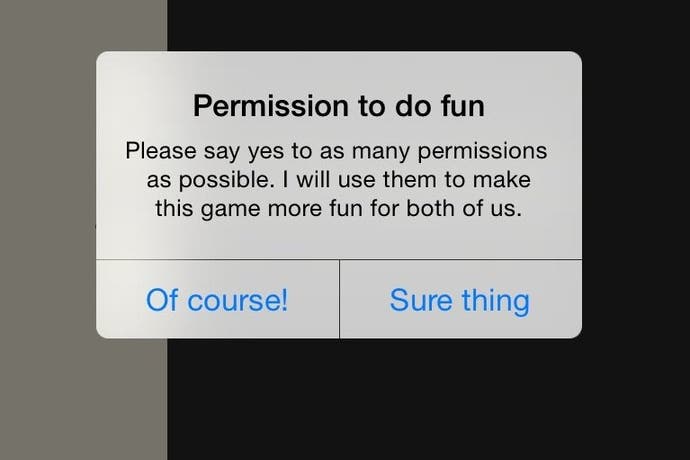Progress to 100 is a novel fourth wall-breaking mobile puzzler
Permission to do fun.
"You're playing it wrong." This frequently uttered pedantic phrase tends to draw my ire as it suggests a myopic view that your way of enjoying a game is the correct way of enjoying it. Fun isn't fun unless it's your kind of fun, amirite? But with Ludosity's experimental iOS game Progress to 100 I was playing it wrong and yet I still had a bloody good time with it.

So what cardinal sin did I commit embarking on this peculiar puzzler? Simple: I played it alone. Progress is technically a single-player game, but that's not where it thrives. While a single user could brute force their way through Progress' 100 puzzles, that'd be missing the point. It's more challenging sorting all its brainteasers yourself - and in turn more rewarding - but it's less charming. Progress is a game designed to make you look like an idiot, making full use of the device's gyroscopic sensor, mic, camera, touchscreen and more. And looking like an idiot to an audience of no one is missing out on some delightful embarrassment.
Only it's not embarrassing if everyone looks equally ridiculous - and they no doubt would playing Progress. Its 100 puzzles task players with solving a series of cryptic clues using each and every function of a phone. A prompt for "learn to walk" will require you to alternate tapping two fingers across the screen, emulating the pitter-patter of feet. "Look left" should be rather self-explanatory, and before you know it you'll hear the playful pixie of a narrator tell you "Touch the screen with your nose."
"C'mon, it'll be fun," she goads.
Just do it, I reckon. The fourth wall breaking stabs at humour recall cult classic The Stanley Parable and have some of Davey Wreden's sense of absurdist humour.
But Progress isn't just about following directions. It's about cracking brain teasers. Many of them are quite easy - simply cueing the game up by holding your finger on the title screen counts as a puzzle - but they quickly ramp up in difficulty. Some of the later ones, like a prompt for "walk across the street" or "call me" really had me racking my brain for several minutes, wildly gesturing with my iPhone and touching the screen in all manner of peculiar ways searching a solution.
Most of Progress' puzzles aren't terribly challenging though. I breezed through all 100 in less than 90 minutes. But this swiftness is important to the game's pacing. With such minimalist prompts and a finite number of inputs, halting progress for more than a few minutes at a time feels like hours after the rapid-fire novelty of many of Progress' pages. Besides, at a mere £2.29 / $2.99 purchasing Progress won't bruise your wallet too badly. Heading to an Escape the Room game will be just as brief and tens of times the price.
Progress to 100 is short then, and for the most part not too terribly challenging, but that's not a bad thing. Every minute counts as you poke and prod your way through its gauntlet of ludicrous, fourth wall-shattering challenges. And by the time you solve the 100th page, you'll feel like the smartest chap on the block. But feeling smart isn't Progress' main prerogative; it's to make you have fun. So gather some friends, grab some drinks, and muddle your way through Progress. It'll make you look dumb, feel smart, and have a good laugh all the while.


